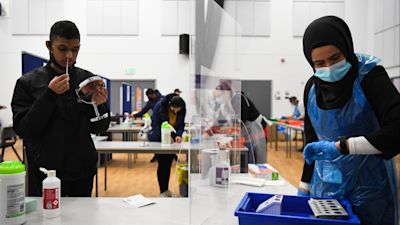Covid: Surge testing in seven new areas as nearly 3,000 cases of Indian variant confirmed in UK

How the UK government is trying to curb the number of Indian Covid variant cases, ITV News Health Editor Emily Morgan reports
Seven new areas have been marked for surge testing and faster vaccination as the government tries to curb the spread of a Covid variant first found in India.
Bedford, Burnley, Leicester, Kirklees, North Tyneside, Hounslow and Glasgow will be added to the list, with Bolton and Blackburn already identified as areas of concern.
Health Secretary Matt Hancock has said a new surveillance system designed to monitor the virus' spread has spotted cases early in Blackburn and Bolton.
There are now 283 cases per 100,000 in Bolton - which doubled in the last week - and there are 25 people in hospital, with the majority unvaccinated, Mr Hancock said.
He added the emergence of the Indian variant meant it was “even more important” for people to get vaccinated.
The Health Secretary told a press briefing: “As I’ve reported to the House of Commons, there are now 2,967 cases known of this variant in the UK and we are determined to do all that we can to ensure this new variant doesn’t put our recovery at risk.
“We’ve acted fast to guard the gains that we have made together.
“We now have an incredibly sensitive biosecurity surveillance system here in the UK … this system spotted the cases in Bolton and in Blackburn early and, through surge testing and increased vaccination, we’re throwing everything at it there.
“The weekly case data in Bolton is now 283 per 100,00 and it doubled in the last week.
“There are now 25 people in Bolton Hospital with Covid – the majority are unvaccinated, nearly 90% have not yet had two vaccines.
“This shows the importance of getting vaccinated, not once but twice."
The B1617.2 variant is thought to be more transmissible than the Kent variant.
The Prime Minister told MPs in the Commons on Wednesday there was "increasing confidence" vaccines are effective against all variants.
But scientists will know more about the transmissibility of the new variant by next week, deputy chief medical officer Professor Jonathan Van-Tam said.
Coronavirus: What you need to know - listen to the latest episode below
He told the Downing Street press conference: “I think scientists are sure that this virus is more transmissible than the strain that it is beginning to replace, which is the old Kent B.117 strain. “The million dollar question is how much more transmissible – we don’t have that yet. “We have a credible range that goes from a few percent more transmissible through to 50% more transmissible – I think most people feel it is going to be somewhere in the middle… but it is just too early. “The best estimate that I can give you is that the data will begin to firm up some time next week and I think next week will be the first time when we have a ranging shot at what the transmissibility increase is. “And that will then feed into models that will help us understand how this looks in terms of the future prospects in terms of resurgent disease, and from there, ministers will be able to make further decisions.” He added the transmission of the new variant is “not inevitable” and it can be slowed down through “cautious behaviour”.
Earlier on Wednesday the government was accused of having "lost control of the messaging" on whether people should travel to amber list countries, with Labour calling for "absolute clarity" on the issue.
It comes as EU ambassadors backed plans to allow vaccinated UK holidaymakers to visit the bloc this summer.
Calling Peston - for more from the world of politics, listen to our podcast